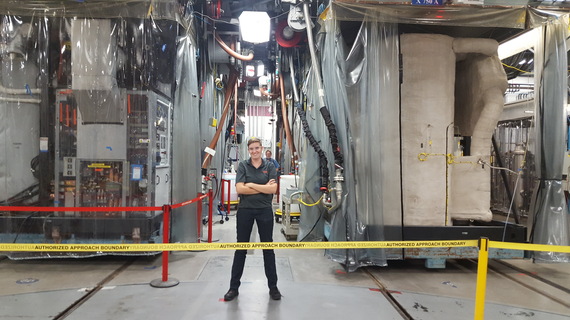Lydia Bussiere's career goal is to apply engineering knowledge and contribute to a better, healthier world. She is an engineer, and especially interested in green energy and sustainable technologies. Armed with a potent combination of personal interest and education, this Smith College alumna has a promising career ahead. Lydia graduated from Smith in 2012 with a Bachelor of Science degree in Engineering Science. She is now employed as a Service Engineering Project Manager for a fuel cell manufacturer.
Fuel cells produce electricity resulting from a chemical reaction, and are considered a form of green energy. Other types of green energy include biogas, geothermal, hydroelectric, solar, and wind energy. Fuel cell technology dates back to the early 1800s, and has evolved considerably since its invention.
Lydia's employer, Doosan Fuel Cell America, Inc. is located in South Windsor, Connecticut. Doosan manufactures hydrogen fuel cells, and stationary hydrogen fuel cell power plants. The fuel cells they produce are approximately ten feet tall and three feet square. Each tractor trailer-sized power plant is equipped with four cells and can produce 440 kilowatts of continuous power.
Lydia joined the company in 2014 as a Senior Test Engineer. She was promoted in 2016 to her current position. Here's how she explains her evolution at Doosan:
"I was moved from our engineering department to our aftermarket and service engineering department in May. As a test engineer, I was focused on day-to-day operations in our manufacturing facility. As the project manager for our service engineering team, I'm instead focused on long-term reliability and efficiency improvements for our fleet of power plants in the field. I also assist with some of the issues that come up in the field. It's a project management role instead of a hands-on role, and I miss getting dirty in the factory at times. However, it's good experience and it's been interesting learning about how the product that I tested in the factory actually functions once it is delivered to the customer. My experience in the factory has also helped when trying to look at cross-functional ways we can improve our processes and our product."
For Lydia, discovering her interest in engineering came about during college:
"In high school, I was one of those people who genuinely liked learning. I was lucky; school wasn't too hard for me, so I was able to enjoy it. I didn't really have a favorite subject. I liked math, but I also liked history. And I loved reading and writing, so English was great too. When I started applying to colleges, I mostly picked smaller liberal arts schools, figuring that I could take a wide variety of classes and decide on a major later.
I decided to attend Smith because I knew that I would get a good education there, regardless of what I majored in. It's interesting to think about how different my path would have been if I had picked one of the other liberal arts colleges I looked at. My first semester, I took cultural anthropology, music theory, geology, Spanish, and Engineering 100 - Engineering for Everyone. Engineering for Everyone ended up being one of the most challenging but interesting and fun classes that I took at Smith.
I spent countless hours in the engineering building at night, learning how to program microcontrollers, use a laser printer, calculate heat loss in a building, and create cement molds. The result was a tiny house that could automatically control its indoor temperature while sitting outside for 12 hours on a day in New England December. I learned some basics in that class, but what I really learned was creative problem solving. I knew that I needed a career that would challenge me and keep me interested, and I also wanted to be able to flex my creative muscles. This one project showed me that engineering could do that for me.
The Picker Engineering Program was founded in 1999, with the first class of 19 graduating in 2004. Since then, 294 students have graduated from the program with a B.S. degree in engineering science.
Smith is a liberal arts college, and its curriculum reflects that. All incoming engineering students take many of the same classes for the first 1.5-2 years. They all take classes in each of the engineering disciplines to get a taste of what their options are. Then, they are allowed to begin choosing electives that most fit their interests. It is an interdisciplinary program, and students are required to write papers and present their work frequently, since it is important that engineers can communicate well. This, especially, is a skill that I've appreciated honing at Smith. It allows me to communicate with engineers, management, and customers alike."
Today's employers actively seek out effective communication. Acquiring STEM knowledge in college may not be enough, if one cannot communicate about their work effectively. For those in college-selection mode, this is something to keep in mind.
There are many advantages for future STEM-career women in attending a women's college, including the opportunity to develop effective communication skills. Earlier I penned a blog post on precisely that topic: Science Majors Develop Effective Communication Skills at Women's Colleges. Other advantages to be found include strong academic programs with opportunities for developing leadership, collaboration, critical thinking, analytical, and problem-solving skills.
To learn more about women's colleges, visit my blog, Advantages of a Women's College, where a complete listing of all women's colleges in the United States is provided.
Follow Diane on Twitter @HerSTEMCareer where she celebrates and champions STEM women from around the world.
Photo Caption: Lydia Bussiere at Doosan's 24/7 manufacturing facility.
Photo Credit: Adam Goldreich
